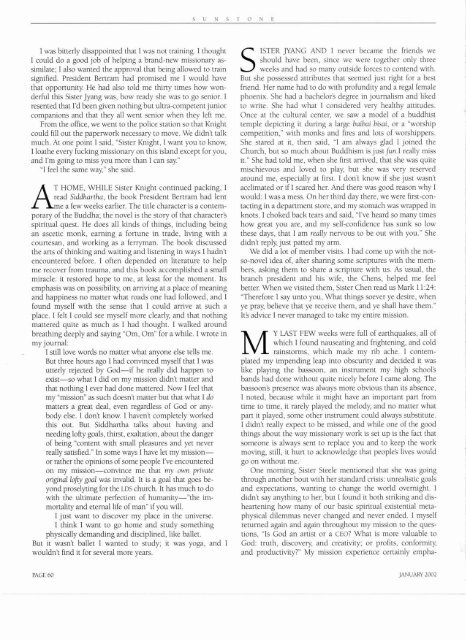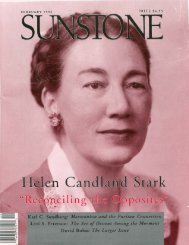Eugene England - Sunstone Magazine
Eugene England - Sunstone Magazine
Eugene England - Sunstone Magazine
You also want an ePaper? Increase the reach of your titles
YUMPU automatically turns print PDFs into web optimized ePapers that Google loves.
S U N S T O N E<br />
I was bitterly disappointed that I was not training. I thought<br />
I could do a good job of helping a brand-new missionary assimilate;<br />
I also wanted the approval that being allowed to train<br />
signified. President Bertram had promised me I would have<br />
that opportunity He had also told me thirty times how wonderful<br />
this Sister Jyang was, how ready she was to go senior. I<br />
resented that I'd been given nothing but ultra-competent junior<br />
companions and that they all went senior when they left me.<br />
From the office, we went to the police station so that Knight<br />
could fill out the papenvork necessary to move. We didn't talk<br />
much. At one point I said, "Sister Knight, I want you to know,<br />
I loathe every fucking missionary on this island except for you,<br />
and I'm going to miss you more than I can say"<br />
"I feel the same way," she said.<br />
A<br />
T HOME, WHILE Sister Knight continued packing, I<br />
read Siddhartha, the book President Bertram had lent<br />
me a few weeks earlier. The title character is a contemporary<br />
of the Buddha; the novel is the story of that character's<br />
spiritual quest. He does all kinds of things, including being<br />
an ascetic monk, earning a fortune in trade, living with a<br />
courtesan, and working as a ferryman. The book discussed<br />
the arts of thinking and waiting and listening in ways I hadn't<br />
encountered before. I often depended on literature to help<br />
me recover from trauma, and this book accomplished a small<br />
miracle: it restored hope to me, at least for the moment. Its<br />
emphasis was on possibility, on amving at a place of meaning<br />
and happiness no matter what roads one had followed, and I<br />
found myself with the sense that I could arrive at such a<br />
place. I felt I could see myself more clearly, and that nothing<br />
mattered quite as much as I had thought. I walked around<br />
breathing deeply and saylng "Om, Om" for a while. I wrote in<br />
my journal:<br />
I still love words no matter what anyone else tells me.<br />
But three hours ago I had convinced myself that I was<br />
utterly rejected by God-if he really did happen to<br />
exist-so what I did on my mission didn't matter and<br />
that nothing I ever had done mattered. Now I feel that<br />
my "mission" as such doesn't matter but that what I do<br />
matters a great deal, even regardless of God or anybody<br />
else. I don't know. I haven't completely worked<br />
this out. But Siddhartha talks about having and<br />
needing lofty goals, thirst, exaltation, about the danger<br />
of being "content with small pleasures and yet never<br />
really satisfied." In some ways I have let my missionor<br />
rather the opinions of some people I've encountered<br />
on my mission-convince me that my own private<br />
original lofty goal was invalid. It is a goal that goes beyond<br />
proselyting for the LDs church. It has much to do<br />
with the ultimate perfection of humanity-"the immortality<br />
and eternal life of man" if you will.<br />
I just want to discover my place in the universe.<br />
I think I want to go home and study something<br />
physically demanding and disciplined, like ballet.<br />
But it wasn't ballet I wanted to study; it was yoga, and I<br />
wouldn't find it for several more years.<br />
S<br />
ISTER JYANG AND I never became the friends we<br />
should have been, since we were together only three<br />
weeks and had so many outside forces to contend with.<br />
But she possessed attributes that seemed just right for a best<br />
friend. Her name had to do with profundity and a regal female<br />
phoenix. She had a bachelor5 degree in journalism and liked<br />
to write. She had what I considered very healthy attitudes.<br />
Once at the cultural center, we saw a model of a buddhist<br />
temple depicting it during a large baibai bisai, or a "worship<br />
competition," with monks and fires and lots of worshippers.<br />
She stared at it, then said, "I am always glad I joined the<br />
Church, but so much about Buddhism is justfun.1 really miss<br />
it." She had told me, when she first arrived, that she was quite<br />
mischievous and loved to play, but she was very reserved<br />
around me, especially at first. I don't know if she just wasn't<br />
acclimated or if I scared her. And there was good reason why I<br />
would: I was a mess. On her third day there, we were first-contacting<br />
in a department store, and my stomach was wrapped in<br />
knots. I choked back tears and said, "I've heard so many times<br />
how great you are, and my self-confidence has sunk so low<br />
these days, that I am really nervous to be out with you." She<br />
didn't reply, just patted my arm.<br />
We did a lot of member visits. I had come up with the notso-novel<br />
idea of, after sharing some scriptures with the members,<br />
asking them to share a scripture with us. As usual, the<br />
branch president and his wife, the Chens, helped me feel<br />
better. When we visited them, Sister Chen read us Mark 11:24:<br />
"Therefore I say unto you, What things soever ye desire, when<br />
ye pray, believe that ye receive them, and ye shall have them."<br />
It's advice I never managed to take my entire mission.<br />
Y LAST FEW weeks were full of earthquakes, all of<br />
which 1 found nauseating and frightening, and cold<br />
rainstorms, which made my rib ache. I contemplated<br />
my impending leap into obscurity and decided it was<br />
like playlng the bassoon, an instrument my high school's<br />
bands had done without quite nicely before I came along. The<br />
bassoon's presence was always more obvious than its absence,<br />
I noted, because while it might have an important part from<br />
time to time, it rarely played the melody, and no matter what<br />
part it played, some other instrument could always substitute.<br />
I didn't really expect to be missed, and while one of the good<br />
things about the way missionary work is set up is the fact that<br />
someone is always sent to replace you and to keep the work<br />
moving, still, it hurt to acknowledge that people's lives would<br />
go on without me.<br />
One morning, Sister Steele mentioned that she was going<br />
through another bout with her standard crisis: unrealistic goals<br />
and expectations, wanting to change the world overnight. I<br />
didn't say anything to her, but I found it both striking and disheartening<br />
how many of our basic spiritual existential metaphysical<br />
dilemmas never changed and never ended. I myself<br />
returned again and again throughout my mission to the questions,<br />
"Is God an artist or a CEO? What is more valuable to<br />
God: truth, discovery, and creativity; or profits, conformity,<br />
and productivity?" My mission experience certainly empha-<br />
PAGE 60 JANUARY 2002

















